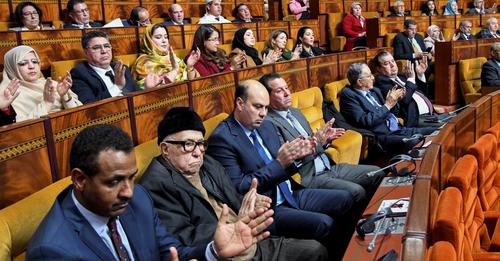Africa
Morocco decides to evaluate its relationship with the European Parliament

After a resolution urged the kingdom to protect press freedom, all of Morocco’s MPs agreed on Monday to look into their relationship with the European Parliament, which they say is meddling in their affairs.
In response to the non-binding European law that was passed on Thursday, members of both houses of Morocco’s parliament met in the capital city of Rabat for a joint session.
In a statement released after their meeting, the Moroccan lawmakers called the European resolution “an outrageous attack against the sovereignty, dignity, and independence of judicial institutions in the country.”
They claimed it badly damaged their relationship’s foundational trust.
As a result, according to Rachid Talbi Alami, speaker of the House of Representatives, Morocco’s Parliament “decided to reassess its relations with the European Parliament and submit them for an overall evaluation.” He said nothing more in depth.
An agreement from 1996 says that Morocco and the European Union have close economic and business ties, especially in the fields of agriculture and fishing.
Mohammed Ghiat, the leader of the National Rally of Independents, which is the largest party in Morocco’s ruling coalition, declared that “their actions are not going to intimidate us, and we are not going to modify our route or attitude.”
The Moroccan government had been urged by European legislators in Strasbourg to “respect freedom of expression and media freedom” and to “ensure imprisoned journalists a fair trial.”
Reporters Without Borders (RSF), a watchdog organization, hailed the vote in the EU parliament as a break from “25 years of inaction.”
Some parliamentarians believed France, Morocco’s old colonial power, was driving the European legislation.
According to Ahmed Touizi of the Authenticity and Modernity Party, “behind the scenes of this decision is a country that we had considered as a friend and a reliable partner, but the scent of gas has made it lose it.”
Touizi, whose party is a component of the ruling coalition, was referring to improving ties between Paris and Algeria, Morocco’s adversary and major gas exporter to Europe. Algeria is also a neighbor of Morocco.
AFP was informed by Abdelmajid Fassi Fihri of the Istiqlal Party that “Morocco has had enough of double standards.” He regretted that the European Parliament had not denounced Algeria’s attacks on journalistic freedom.
jailed journalists
Omar Radi and Soulaimane Raissouni, two of the most well-known journalists in Morocco, were both condemned at an appeal last year on charges of sexual abuse.
READ ALSO: Conte begs Spurs not to “lose the nastiness” in their struggle
Radi, who is 36 and has spoken out against the Moroccan government, was given a six-year prison sentence for rape and espionage, both of which he strongly denies.
Raissouni is currently serving a five-year term.He too has consistently defended his innocence and claims that he was charged “because of his ideas.”
The government of Morocco says that its courts are fair and that the cases against journalists have nothing to do with their jobs.
Last week, European lawmakers said that the European Parliament was still going to “fully investigate” corruption and were “very worried” about claims that Moroccan officials had paid its members.
The MEP corruption scandal that broke last month sent shockwaves through Brussels’ EU circles, with MEPs being accused of accepting bribes from both Morocco and Qatar.
Both nations vigorously refute the charges.
An “authorized source” at the Rabat foreign ministry was cited by a government-affiliated media outlet as saying the EU action would have “no impact on Morocco” in response to the resolution.
It “fits with the attacks and harassments the kingdom has had to deal with from people who don’t like Morocco’s growth, wealth, and strong influence in the region,” the source said.
